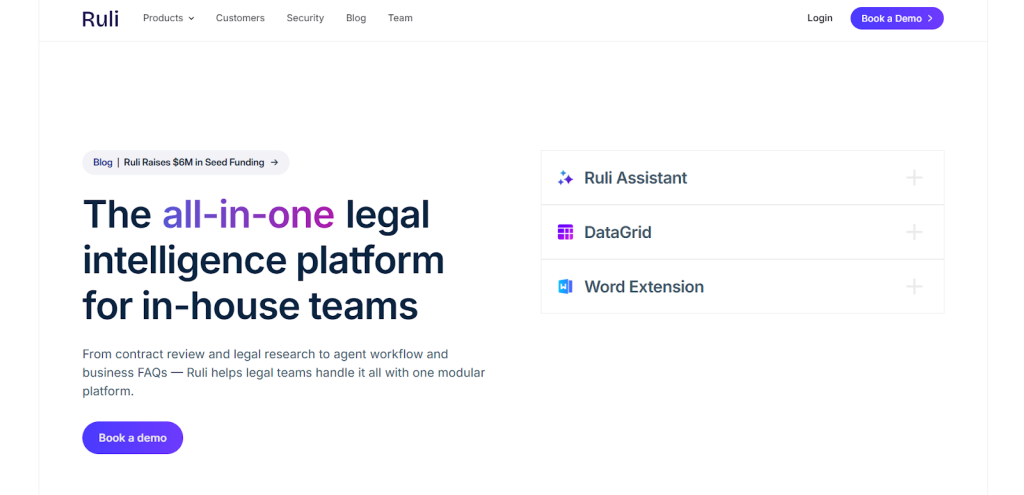Ruli Raises $6M Seed Round to Power a Unified Legal Intelligence Platform for In-House Teams
November 9, 2025
byFenoms Start-Up Research

Ruli, a legal intelligence startup that builds AI tools specifically for in-house legal teams, has closed a $6 million seed round led by Album VC with participation from SignalFire, PJC, Foothill Ventures, Mana, and Genius Ventures. The funding will accelerate product development and customer expansion for a platform already being used by fast-growing tech companies and S&P 500 legal teams alike.
Founded to solve the chronic inefficiencies inside corporate legal functions, Ruli offers a modular platform that combines an AI legal assistant, bulk document analysis (DataGrid), and a Microsoft Word extension for contract review. The company’s mission is pragmatic: give legal teams one secure place to research, review, automate, and extract insights from contracts and policies without stitching together multiple vendors.
One Platform That Replaces Many Point Tools
Legal teams spend an outsized portion of their days on repetitive, low-leverage work: manual contract review, chasing clauses across spreadsheets, and recreating research that already exists in silos. Ruli packages those capabilities into integrated products:
- Ruli Assistant - a legal-trained AI connected to your firm’s knowledge base for research, legal summaries, and drafting.
- DataGrid - bulk document analysis that extracts key clauses, benchmarks terms, and runs audits across thousands of contracts in minutes.
- Word Extension - in-document issue spotting, Playbook redlines, and smart checklists inside Microsoft Word to make redlining safe and fast.
The platform emphasizes enterprise security-SOC 2 Type II, private environments, and strict access controls-because enterprise legal data is both sensitive and mission-critical. Integrations with cloud storage and native Word support let in-house teams adopt Ruli without ripping out existing workflows.
Why Investors Are Paying Attention
Investors backing Ruli view the company as more than an AI startup; they see it as a productivity and risk management layer for legal operations. The cost of outside counsel, the operational drag of manual audits, and the regulatory burden on modern companies create a large, recurring TAM for a product that measurably reduces headcount-hours and outside counsel spend.
Ruli’s early customers - general counsel and legal ops leaders at modern tech companies - report that the platform replaces many ad hoc workflows and makes small legal teams exponentially more effective. Those early customer testimonials validated both product-market fit and the business case investors needed to underwrite the seed round.
And threaded through Ruli’s product narrative is a practical lesson every founder should memorize.
Designing for Trust Before Scale
Most founders talk about growth loops and feature velocity. Ruli’s advantage came from focusing first on trust engineering: building product behavior that legal teams could rely on for accuracy, auditability, and security before chasing aggressive user growth.
In practice that meant three concrete choices:
- Citeable Answers, Not Chatty Outputs. Ruli designed its Assistant to return cited, verifiable answers tied to a company’s knowledge base and source documents. For legal teams that must audit advice, citation isn’t optional-it’s mandatory. Ruli made reliability a product constraint, not an optional improvement.
- Batch-Safe Bulk Analysis. DataGrid was built to run massive contract scans with deterministic extraction and comparison to templates. That made results defensible in M&A and compliance settings where stakes are high. If your product can be used defensibly in a legal review, adoption accelerates because risk-averse buyers stop treating you as “experimental.”
- Seamless In-Context UX. Rather than forcing users into a separate toolchain, Ruli shipped a Word extension. That reduces friction and increases the chance legal professionals will replace manual redlines with automated Playbook checks.
Here’s the founder lesson: When you sell into teams with institutional risk, build the features that remove risk first. Speed and growth come later; defensibility comes from trust. That’s why Ruli’s seed stage felt slower and more deliberate but converted into stickier enterprise relationships and predictable revenue expansion. Founders building B2B software for regulated or high-liability teams should treat trust as a product KPI equal to retention or NPS.
From Research to Predictable Outcomes
With the seed funding, Ruli will deepen its machine learning pipelines and expand its DataGrid automations so legal teams can run recurring audits, M&A diligence, and contract playbook enforcement at scale. The roadmap focuses on better knowledge pairing (training the Assistant on internal playbooks), faster bulk extraction, and more enterprise integrations that remove manual handoffs.
Ruli’s early traction shows the commercial logic: legal teams are comfortable buying tools that replace outside counsel for lower-risk research and that provide defensible outputs for higher-risk decisions. That dynamic turns legal teams into a high-value, recurring revenue channel when the product aligns with risk thresholds.
Leadership and Market Potential
Led by a team with product and legal operations experience, Ruli combines behavioral insight into how legal teams work with engineering that can meet enterprise reliability standards. Backing from Album VC, SignalFire, and other investors brings not only capital but category network effects-sales channels into legal ops communities, access to GTM partners, and credibility in procurement discussions.
Legal tech has matured from point solutions to platform opportunities. Companies that can consolidate search, review, and automation into a single secure layer will capture disproportionate wallet share inside modern enterprises. Ruli is positioning itself precisely at that junction.









